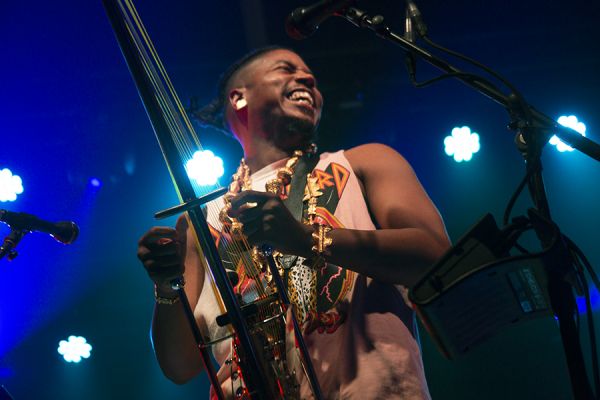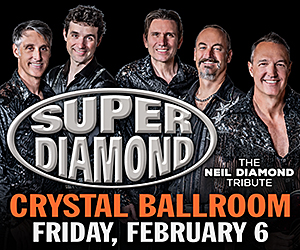Home > Jazz / Blues
02/27/2022
Christian Scott aTunde Adjuah at the Aladdin Theater 2/25/22 / Review
By MICHAEL SHOEHOEN CONLEY // This band projected an awesome level of energy, managing to sound both rootsy and futuristic in the same moment, with an utterly modern and relentless polyrhythmic drive.
This week OMN experienced both Christian Scott aTunde Adjuah’s virtuosic uplift and Angel Bat Dawid’s trauma. Black Americans of the same generation, these artists offered contrasting levels of musicianship and social commentary in the context of the Biamp PDX Jazz Festival.
Part 1) Chief Christian Scott aTunde Adjuah at the Aladdin Theater:
New Orleans native Christian Scott Atunde Adjuah, also known as Chief Adjuah, is one of the finest trumpet players I have ever heard. But a recent musical sideline of his has been a double-row harp. Similar to the kora and the ngoni from Africa, held in front of the player with the aid of a strap, Adjuah’s instrument is constructed of metal. He calls it “Chief Adjuah’s Harp”, quipping that “if I paid for it I might as well name it after myself.”
Opening his set on the harp with “Bark Out Thunder, Roar Out Lightning”, he sang uplifting, philosophical lyrics with a rich tone, and the kind of breath control and articulation befitting a master trumpeter.
After explaining the story of the harp, and the joy of approaching a new instrument as a beginner, he said “don't worry I'm going to play this old B-flat now”, referring to his visually striking, custom-made trumpets. Included in the billing was percussionist Weedie Braimah, who is especially impressive on the Djembe, the goblet-shaped West African drum very popular around the globe in recent decades for its powerful combination of higher, penetrating tones near the edge with booming bass tones obtained by striking the center of the skin. Braimah got some impressive licks in during that first tune, but the second piece included a duet segment with kit drummer Ele Howell which built to an explosive frenzy, only to subside for Scott to come in chill with some cool long notes before ascending another climactic peak.
The next song, titled “Diaspora” had a modified, souped-up version of the “second line” beat originated by New Orleans bands, but this one had some special sauce to it. On this number saxophonist Emilio Modeste played a formidable tenor solo, managing a brief nod to the Star Wars theme and a classic John Coltrane riff, with the sax and trumpet playing some nice unison lines to end the piece.
Next we got the funky Rhodes piano stylings of Lawrence Fields, originally from St. Louis, who played a beautiful and complex intro before calling in the band. Drummer Howell, all of 23 years old, was in beast mode here, and Scott’s solo featured some of his wonderful, spacey descending trills.
Another song, titled “Huntress”, started and ended with the bass player Amina Scott, with a tasty solo from Modeste on soprano sax. With the stage bathed in green light, this one reminded me of trumpeter Olu Dara and an album he made in the 90s that I liked.
This band projected an awesome level of energy, managing to sound both rootsy and futuristic in the same moment, with an utterly modern and relentless polyrhythmic drive. The overall vibe reminded me of the excitement I felt at rock concerts that I attended as a teenager, and the music had that kind of cosmic ambition matched with the deep soulfulness of the best progressive rock and jazz. Scott calls it “Stretch Music”, which is also the name of his record label.
Christian Scott managed to impart a lot of wisdom without ever coming off like a preacher or a pedant. One of the things he said was “this music has a home that precedes the American Experience”, which is an oblique way of saying that whatever you think of as jazz music, it's not necessarily an American creation.
Scott closed with a dedication to his grandfather Donald Harrison, Sr., titled “The Last Chieftain”.
To be continued.
See Diane Russell's full gallery of photos from this concert here.








